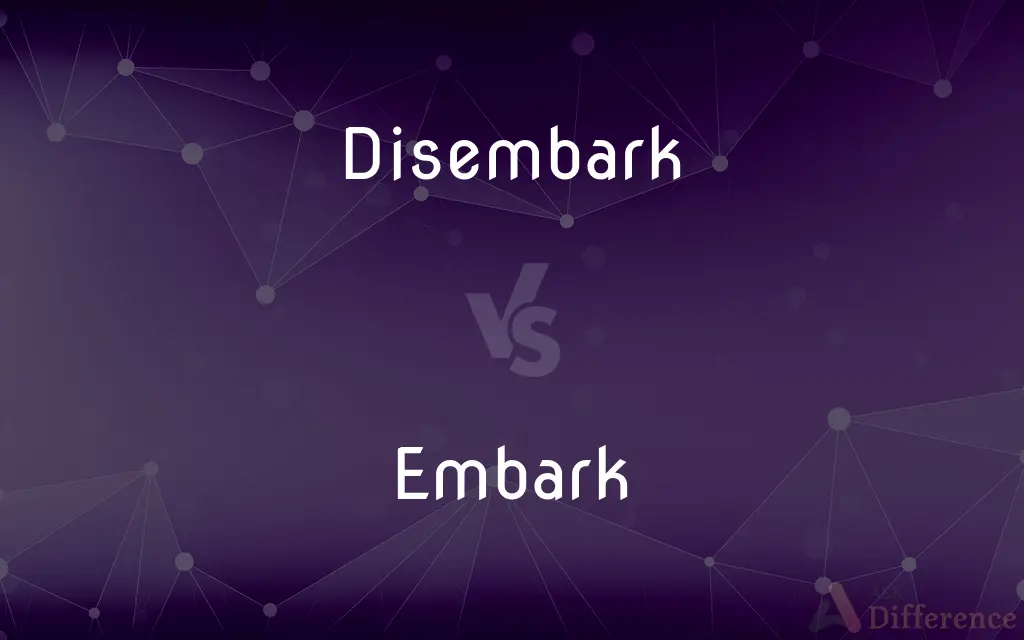Disembark vs. Embark — What's the Difference?
By Fiza Rafique — Updated on October 3, 2023
"Disembark" means to leave a vehicle, especially a ship or an aircraft, while "embark" means to board a vehicle, especially a ship or aircraft, or to begin a journey or endeavor.

Difference Between Disembark and Embark
Table of Contents
ADVERTISEMENT
Key Differences
Disembark" and "embark" are two terms that often relate to travel, especially by ship or aircraft. When travelers leave a ship after a long journey at sea, they "disembark" from it. On the other hand, before the ship sets sail, travelers "embark" onto it.
Regarding aircraft, passengers "embark" when they get on the plane and "disembark" when they exit. The orderliness of these processes is crucial for ensuring passengers' safety, as well as for keeping flight schedules punctual.
Beyond the realm of travel, "embark" can also denote the beginning of any significant project or venture. For example, an entrepreneur might "embark" on a new business venture. In contrast, "disembark" is less commonly used outside of the context of exiting a vehicle.
From a grammatical standpoint, while both words can function as verbs, "embark" has a broader range of applications. "Embark" can also mean to invest or to commit oneself to a particular course of action. "Disembark" primarily focuses on the act of leaving a vehicle.
Comparison Chart
Primary Meaning
To leave a vehicle
To board a vehicle or begin a venture
ADVERTISEMENT
Common Usage
Exiting ships and aircraft
Boarding ships, aircraft, or starting endeavors
Extended Usage
Limited to exiting context
Includes investing or starting a project
Verb Form
Primarily used as a verb
Used as a verb
Prepositions Used
Commonly followed by "from"
Commonly followed by "on" or "upon"
Compare with Definitions
Disembark
To exit a ship after a journey.
The passengers were eager to disembark after the long cruise.
Embark
To board an aircraft before a flight.
Passengers should embark at gate 7.
Disembark
To leave an aircraft post-flight.
We will disembark from the plane once it's at the gate.
Embark
To board a ship for a journey.
They will embark on the cruise liner tomorrow.
Disembark
To alight from any mode of transport.
The tourists will disembark from the bus at the next stop.
Embark
To start a significant endeavor.
She decided to embark on a new career path.
Disembark
To offload goods from a conveyance.
The cargo was set to disembark at the next port.
Embark
To commence a course of action.
The team is about to embark on a challenging project.
Disembark
To exit from a ship, aircraft, or other vehicle.
Embark
Go on board a ship or aircraft
He embarked for India in 1817
Disembark
To remove from a ship, aircraft, or other vehicle.
Embark
Begin (a course of action)
She embarked on a new career
Disembark
(transitive) To remove from on board a vessel; to put on shore
The general disembarked the troops.
Embark
To cause to board a vessel or aircraft
Stopped to embark passengers.
Disembark
(intransitive) To go ashore out of a ship or boat; to leave a train or aircraft.
Embark
To enlist (a person or persons) or invest (capital) in an enterprise.
Disembark
To remove from on board a vessel; to put on shore; to land; to debark; as, the general disembarked the troops.
Go to the bay, and disembark my coffers.
Embark
To go aboard a vessel or aircraft, as at the start of a journey.
Disembark
To go ashore out of a ship or boat; to leave a ship; to debark.
And, making fast their moorings, disembarked.
Embark
To set out on a venture; commence
Embark on a world tour.
Disembark
Go ashore;
The passengers disembarked at Southampton
Embark
To get on a boat or ship or (outside the USA) an aeroplane.
All passengers please embark now.
Disembark
To step out or away from a situation.
He decided to disembark from the ongoing discussions.
Embark
To start, begin.
Phil embarked on his journey yesterday.
Embark
(transitive) To cause to go on board a vessel or boat; to put on shipboard.
Embark
(transitive) To engage, enlist, or invest (as persons, money, etc.) in any affair.
He embarked his fortune in trade.
Embark
To cause to go on board a vessel or boat; to put on shipboard.
Embark
To engage, enlist, or invest (as persons, money, etc.) in any affair; as, he embarked his fortune in trade.
It was the reputation of the sect upon which St. Paul embarked his salvation.
Embark
To go on board a vessel or a boat for a voyage; as, the troops embarked for Lisbon.
Embark
To engage in any affair.
Slow to embark in such an undertaking.
Embark
Go on board
Embark
Set out on (an enterprise, subject of study, etc.);
She embarked upon a new career
Embark
Proceed somewhere despite the risk of possible dangers;
We ventured into the world of high-tech and bought a supercomputer
Embark
To invest in a venture.
The company decided to embark a significant amount in the startup.
Common Curiosities
Can "disembark" be used for vehicles other than ships and planes?
Yes, while less common, "disembark" can be used for any mode of transport, like buses or trains.
What's the opposite of "embarkation"?
The opposite of "embarkation" is "disembarkation."
Is "embarkation" the act of boarding?
Yes, "embarkation" refers to the process of boarding a vessel or vehicle.
Is it correct to say "embark onto a plane"?
While it's understood, it's more common to say "embark on a plane."
In which contexts is "disembark" most frequently used?
"Disembark" is most frequently used in the context of sea and air travel.
Can "embark" mean to begin something non-physical, like a project?
Yes, "embark" can also signify the start of any significant venture or project.
Can "disembark" be used metaphorically?
While primarily used in a literal context, "disembark" can sometimes be used metaphorically, e.g., to leave a situation.
Does "disembark" always involve a physical move?
Primarily, yes, but it can be used metaphorically to denote moving away from a non-physical situation.
Do "disembark" and "embark" derive from the same root?
Yes, they both derive from the Old French "embarquer," where "dis-" is a prefix meaning "away from."
Can "embark" be used without specifying what one is boarding or beginning?
Yes, one can say "embark on a journey" without specifying the mode of transport.
Share Your Discovery

Previous Comparison
Enemy vs. Rival
Next Comparison
Galaxy vs. UniverseAuthor Spotlight
Written by
Fiza RafiqueFiza Rafique is a skilled content writer at AskDifference.com, where she meticulously refines and enhances written pieces. Drawing from her vast editorial expertise, Fiza ensures clarity, accuracy, and precision in every article. Passionate about language, she continually seeks to elevate the quality of content for readers worldwide.














































